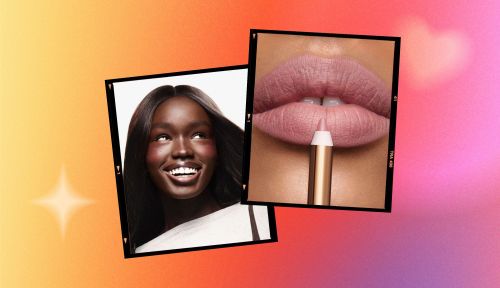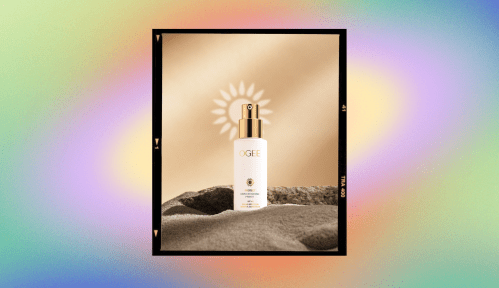Our editors independently select these products. Making a purchase through our links may earn Well+Good a commission
5 Retinol Products That Are So Gentle, Derms Say You Can Even Use Them With Eczema
Is retinol good for eczema? Here's what derms want you to know before introducing the ingredient into your routine.

If you have sensitive skin, then you’re likely well aware of just how reactive your complexion can be to certain ingredients. And if eczema, an inflammatory skin condition that causes red, dry, itchy patches, is the cornerstone of your sensitive skin, then you may very well have convinced yourself that some extremely effective ingredients (hello, retinol) are simply off the table.
Experts in This Article
board-certified dermatologist and clinical instructor of dermatology at Weill Medical College of Cornell University
board-certified dermatologist in New York City
But have you ever stopped to wonder if unwarranted fear of a reaction is holding you back from some seriously stellar results? Because according to two dermatologists, people with eczema can, in fact, add retinol to their skin-care routine. There’s simply a right and wrong way to do it. Keep reading to learn more.
Can people with eczema use retinol?
According to Michele Green, MD, a board-certified dermatologist based in New York, those with eczema have particularly sensitive skin and are prone to “flare-ups” in which their skin becomes inflamed with rashes, blisters, and recurring skin infections. All of these things can make skin feel rough and look red, and, as Dr. Green points out, some ingredients can absolutely trigger a flare-up—retinol included.
“Retinoids are a derivative of vitamin A and have been known to treat acne by preventing dead cells from clogging pores,” Dr. Green explains. “This reduces the chance for bacterial accumulation and therefore, clears acne and reduces future breakouts. Retinoids also boost cell turnover, fight free radicals, and increase collagen growth, which prevents aging and improves our skin’s overall appearance.”
That said, Dr. Green admits that retinoids are known to irritate the skin when first introduced, and may cause adverse side effects such as dryness, sensitivity to sunlight, redness, and blistering (AKA “the retinol uglies“). Because of this, Dr. Green says it’s important to be mindful of not only the retinoid you introduce into your routine but the strength of your starting skin barrier, too.
How to properly use retinol with eczema
“Although retinoids may trigger eczema flare-ups, they offer great benefits if you are able to incorporate them into your skin-care regimen,” she says, noting that taking a few preliminary steps will make a world of difference for how eczema-prone skin will react to retinoids.
“First, you will need to strengthen your skin barrier, because those with eczema have dry skin due to a compromised skin barrier. To prepare for the introduction of retinoids, you should moisturize daily, especially right after you get out of the shower. You should also stop exfoliating for at least two weeks while using sunscreen with an SPF of 30 and up whenever you go outside.”
Once you’ve committed to these steps, Dr. Green says it’s perfectly fine to introduce an over-the-counter retinol into your routine twice a week. OTC products work best, because these formulas are less potent than prescription retinoids, and using them only twice a week will allow your skin to adjust. If your skin fares well after a few weeks of use, Dr. Green says you can use it more frequently and/or transition to a higher dosage retinoid.
“When using any retinoid, make sure to apply a pea-sized amount after moisturizing your face to minimize dryness,” she says. “It usually takes about three weeks for your skin cells to adapt to retinoids, and mild redness and irritation are a sign that it’s working. But, if you experience extreme discomfort and diffuse redness, it may mean that you need to switch to a lower dose or use retinoids less frequently.”
Dermatologist-Approved Retinol Products for Eczema-Prone Skin
Not all retinoids are created the same. “Retinoic acid, or tretinoin, is the retinoid form that can be used by the skin, making it the most potent, but it’s available only by prescription,” says NYC-based dermatologist Dr. Hadley King. “The other retinoids that are found commonly in OTC products are retinyl palmitate, retinol, and retinaldehyde. These have to undergo a conversion process in order to turn into retinoic acid before the skin can use them… The more steps required to be converted into retinoic acid, the weaker the retinoid is.” So for those with sensitive skin who can’t tolerate stronger forms of the ingredient, retinol or retinyl palmitate may be better options.”
Need a recommendation? Find five, below.
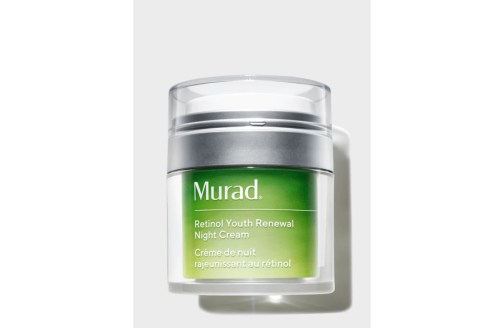
Murad Retinol Youth Renewal Night Cream — $84.00
“Murad Retinol Youth Renewal Night Cream works for all skin types and minimizes the signs of aging while simultaneously strengthening the skin’s barrier,” says Dr. Green. “It contains a fast-acting retinoid, time-released retinol, and a retinol booster to give users a youthful appearance. It also contains niacinamide and picolinamide, which protect against environmental damage while keeping your skin feeling fresh and hydrated.
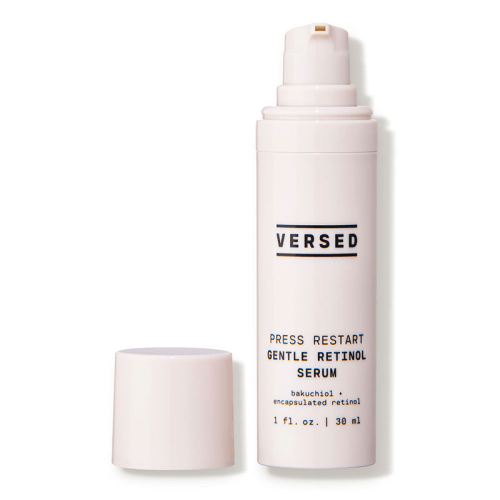
Versed Press Restart Gentle Retinol Serum — $22.00
“This product is specially formulated for those with sensitive skin and first-time retinol users,” says Dr. Green. “It contains microencapsulated retinol, a lower dosage retinol than most other products, which minimizes skin irritation and redness. In addition, this serum also contains other retinol derivatives like bakuchiol and arophira, which also help in brightening the skin, minimizing enlarged pores, and decreasing the appearance of fine lines and wrinkles.”
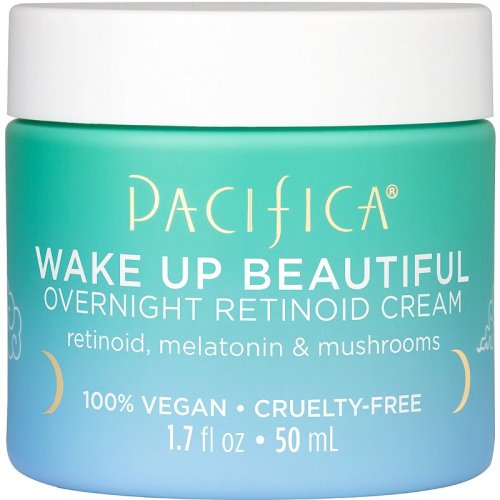
Pacifica Wake Up Beautiful Overnight Retinoid Cream — $24.00
“The Pacifica Wake Up Beautiful Overnight Retinoid Cream is a light-weight retinoid cream that you can feel good about using since it’s 100% vegan and cruelty-free, and contains ingredients that are clinically proven to repair your skin as you sleep,” says Dr. Green. “It’s made with granactive retinoids, which are less irritating than traditional retinol while still having the same anti-aging and anti-acne properties. This product also contains melatonin and quinoa extracts which fight free radicals and keep the skin hydrated throughout the night.
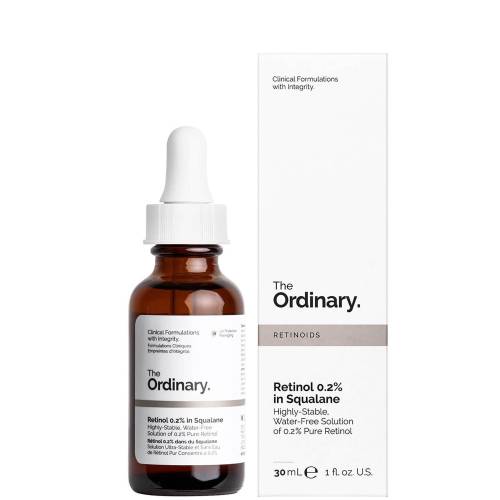
The Ordinary Retinol 0.2% in Squalene — $7.00
“The Ordinary Retinol 0.2% in Squalene contains just 0.2 percent retinol, which can aid in the appearance of photodamage and textual irregularities while being gentle on the skin,” says Dr. Green. “This product is also extremely affordable at just $7 and is a good beginner retinol to use in order to see if retinol would be a good fit for you.”
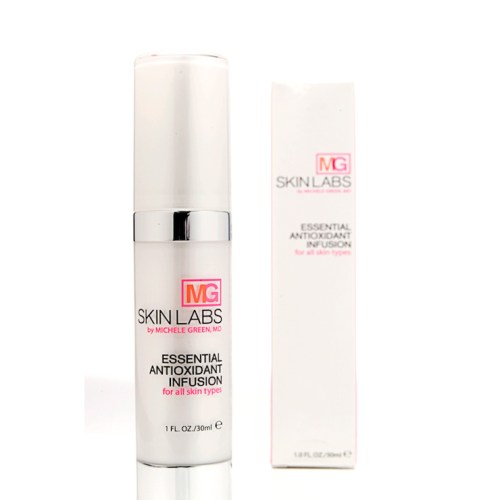
MGSkinLabs, Inc Essential Antioxidant Infusion — $150.00
“My MGSkinLabs, Inc Essential Antioxidant Infusion works for all skin types, including those with eczema,” says Dr. Green. “This unique formulation contains vitamins A (retinol), C, E, and other nutrients that work to exfoliate your skin and give you a youthful and glowing appearance. This product works great in diminishing fine lines and improving skin texture without causing irritation. In addition, it contains dimethicone and cyclomethicone, which are gentle, moisturizing ingredients.”
The Takeaway
In summary, you can use retinol if you have eczema, but you must do so with caution. And, even when you’re careful about how and when and what kind of retinol you use, it’s important to understand that the retinization process can cause adverse effects for the first few weeks.
“The use of retinoids makes your skin worse before making it better for about three weeks as your skin acclimates,” says Dr. Green. “Common side effects include dryness, redness, tightness, and mild peeling. If the retinol concentration is too high, you may experience other more severe side effects like itchiness and scaly patches. Eczema flare-ups are also possible, but are rare with gentler retinol formulations and slow incorporation into your skin-care routine.”
If you can muster up the patience to deal with that, though, Dr. Green says that you should experience less frequent acne breakouts and a more rejuvenated appearance overall within six months of use, which can ultimately help reduce eczema-related redness and textural concerns. Just take it slow, keep your eye on the prize, and whatever you do, don’t forget to wear sunscreen, because retinol makes skin more susceptible to burning, which can then lead to redness for a whole other reason.
“If you have any concerns, consult a board-certified dermatologist to find a treatment plan that works for your skin,” Dr. Green concludes.
For more intel on how to properly introduce retinol into any routine, check out the video below.
Want even more beauty intel from our editors? Follow our Fineprint Instagram account) for must-know tips and tricks.
Sign up for the Well+Good SHOP Newsletter
Get exclusive deals on wellness, beauty, fitness, and food products that have been hand-picked by our editors.
Got it, you've been added to our email list.



